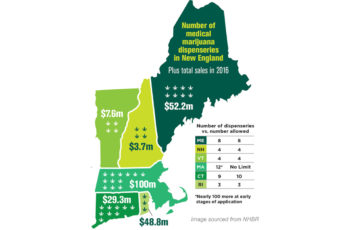NH Senate Crafts a Soviet Style Cannabis Industry for the Live Free or Die State
If you care about the future of cannabis in the state, it’s time to act. Without your help, the legislature will install a Soviet-style command and control cannabis monopoly in New Hampshire. You can use this tool to look up your Senator’s contact information – let them know that this bill cannot become law!
How We Got Here
On May 9, the New Hampshire Senate Judiciary Committee voted to amend and approve HB 1633. This amendment, which replaced the entire bill, was nearly similar but even worse than amendments previously rejected by the House Commerce Committee and the House Finance Committee Division II. On May 16, the Senate passed the amended bill, advancing it to the Senate Finance Committee. However, the Senate’s version of HB 1633 is fraught with issues that could undermine the intent of cannabis legalization in the state.
Here’s why this bill is wrong for New Hampshire.
1. Overreach by the Liquor Commission
One of the most troubling aspects of the Senate’s version of HB 1633 is the significant expansion of law enforcement authority granted to the Liquor Commission. The bill gives the Commission “primary responsibility for the enforcement of all cannabis laws statewide”, including laws against personal home cultivation and public consumption. This is a stark contrast to the House’s version, which limits the Liquor Commission’s authority to enforcement on premises where cannabis is lawfully sold, stored, distributed, or manufactured. The House version also explicitly states that the enforcement of the Controlled Drug Act is not the Commission’s responsibility.
This overreach could lead to a new “Weed Police” force within the Liquor Commission, adding unnecessary complexity and redundancy to state law enforcement. Will the Liquor Commission be setting up stings at the border for residents that prefer to purchase in surrounding states because it may cut into their sales? Will they be kicking in doors of anyone suspected of growing a plant at home? These are serious questions that have yet to be addressed.
2. New Criminal Penalties
The Senate’s version introduces new misdemeanors for second offenses of smoking or vaporizing in public and for consuming cannabis in a moving vehicle. These new criminal penalties are a step backward, contradicting the goal of decriminalizing cannabis use. Under the House’s version, second offenses would be treated as violations with fines, and only third offenses would escalate to misdemeanors. Furthermore, the House version penalizes only drivers, not passengers, for consuming cannabis in vehicles, with fines and potential license suspensions.
Implementing these new penalties would replace one set of criminal penalties with another, ramping them up and undermining efforts to protect personal liberty and reducing the benefits of legalization.
3. Flawed Cannabis Control Commission
The Senate’s version eliminates the advisory board and instead proposes a 12-member Cannabis Control Commission that must approve all rules and regulations before they are proposed. This commission would include several members who have historically opposed cannabis legalization, potentially stalling or obstructing effective implementation. The House’s version, in contrast, follows a more traditional rulemaking process with a balanced 21-member Advisory Board to advise the Liquor Commission on implementing the law.
A commission dominated by opponents of legalization is likely to hinder the successful rollout of a regulated cannabis market.
4. No Tax Exemption for Medical Patients
The Senate’s version allows the sale of “therapeutic grade” products to registered patients at franchise retail stores but does not exempt these sales from the 15% franchise fee. This is a “fee” in name only – it’s a tax on medical cannabis patients. This contrasts sharply with the House’s version, which exempts patients from the 10% agency fee. Moreover, the Senate’s version fails to address how patients would be verified or receive necessary support services, maintaining an unequal “separate but equal” system.
Patients, who are often already burdened by medical expenses, should not be subjected to additional taxes on their medication. For any legislators reading this, if anyone recommends or suggests that taxing medical patients is OK, the answer is always NO. Always!
5. Liquor Commission’s Pricing Authority
Under the Senate’s version, the Liquor Commission is allowed to put it’s hands in plant touching activates up and down the supply chain including the final authority to set the price of all cannabis products sold at retail stores. The House’s version does not allow the Commission to dictate prices to retail stores, leaving those decisions to the business. Allowing the Liquor Commission to set prices could undermine the flexibility needed to manage inventory and ensure that cannabis products remain fresh and affordable.
This provision would create a state-controlled monopoly over cannabis pricing, stifling competition and market responsiveness.
6. Inappropriate Pay Stipends
The Senate’s version authorizes a 10% pay stipend for Liquor Commission staff working on cannabis implementation until 18 months after the first retail store franchise is issued. The House’s version does not include such stipends. These pay raises could incentivize delays in licensing, as staff may benefit financially from prolonged implementation periods.
Taxpayer money should not be used to incentivize delays in the rollout of cannabis legalization.
7. Licensing Priority Issues
The Senate’s version gives equal licensing priority to operators with experience in other states and to New Hampshire’s Alternative Treatment Centers (ATCs). It also prohibits ATCs from being licensed at the same location as a retail store. The House’s version prioritizes ATCs for licensing and allows them to convert to retail outlets.
Prioritizing out-of-state operators could marginalize local businesses that have already invested in the state’s medical cannabis program.
8. Unconstitutional Lobbying Ban
The Senate’s version includes a broad and likely unconstitutional ban on lobbying by licensed cannabis establishments. The House’s version restricts lobbying in a manner consistent with the First Amendment.
Restricting the free speech rights of businesses sets a dangerous precedent and is likely to face legal challenges that delay or prevent the industry from ever getting off the ground.
9. Lack of Economic Opportunity for Residents
The Senate’s version creates a system with high barriers to entry leaving most opportunity for the wealthy and connected. The Liquor Commission has even stated that license and dispensary renovations alone could top $1.2M.
With the cost of everything skyrocketing 40%+ in the last four years residents need economic opportunity. The House version of the bill delivers on the promise, the Senate’s version does not.
UPDATE FROM 5/21/24 SENATE FINANCE COMMITTEE MEETING
Looks like we can add some additional horrible items to the list of why this bill should be killed. Senator’s Bradley and Pearl were successful in adding the following amendments (among others).
10. Keeps Possession and Use ILLEGAL Until January 2026
Legalization would not take effect until January 1, 2026. Instead of stopping the arrests immediately, possession and use can still be arrest-able offenses until that date. The MPP and ACLU’s position of “we need to stop arresting people now” is out the window. Should they support this bill it will be a stain on their reputation for years to come.
11. Empowers the Cannabis Control Commission to set Arbitrary Potency Limits
This includes potency caps on all non-edible products and caps edibles as well. Good luck to NH operators as there will be surrounding states with better products attracting NH consumers.
12. Requires 5 Cultivation Licenses Go to Independent NH Growers.
EDIT: Senator Pearl was kind enough to reach out to clarify his amendment requires at least 5 cultivation licenses to be awarded to independent cultivators with demonstrated experience in New Hampshire agriculture. We may not like what is transpiring in the Senate but want to be fair. Considering there are 88 rec cultivators in Maine and 397 in Vermont this still seems too few assuming it is constitutional. In summary, Hat tip to Senator Pearl on this but still too small a number.
ORIGINAL RETRACTED COMMENT: Sounds great up front, but just five? That is woefully insufficient opportunity for our great farmers who deserve robust economic opportunity to enter and compete in the industry.
What Can You Do About It?
HB 1633, as amended by the Senate, presents numerous problems that could undermine the intent and effectiveness of cannabis legalization in New Hampshire. From expanding the Liquor Commission’s authority to introducing new criminal penalties and creating a flawed regulatory commission, this bill takes more steps backward than forward. Legislators must recognize these flaws and vote against HB 1633 to ensure that any legalization efforts truly benefit the people of New Hampshire.
Call your State Senator and tell them to vote NO on HB 1633 as amended. You can use this tool to identify your Senator and get their phone number. Call them today!
Contact Your State Rep. and Ask Them to Publicly Oppose the Amendment!
Contact Your Senator to Support Reverting Back to HB1633 as Passed by the House!
Contact Your Senator:
- Find Your Senator: https://www.gencourt.state.nh.us/senate/members/wml.aspx
- Locate their Email: https://www.gencourt.state.nh.us/senate/members/senate_roster.aspx
- Click on each of the Senator member links to find their phone number and email.
- Call or send them a respectful email asking them to support HB1633 and to resist the ‘Franchise’ amendment.
Contact Your State Representative:
- Find Your Senator: https://www.gencourt.state.nh.us/senate/members/wml.aspx
- Locate their phone number and email on their profile page.
- Call or send them a respectful email asking them to support HB1633 and to resist the ‘Franchise’ amendment.
HELP SPREAD THE WORD!
Also, a reminder to visit our digital media properties at the links below. Like, follow, request access and share with like minded people in your network.
If you would like to be considered to charter a networking group in Portsmouth, Concord and points west contact us today.
JOIN US ONLINE
- NHCann Manchester Networking Group: https://www.facebook.com/groups/2925591894124493
- NHCann North Country Networking Group: https://www.facebook.com/groups/2949979955281110
- NHCann Nashua Networking Group: https://www.facebook.com/groups/225983842586886
- Like our NHCann Facebook page: https://www.facebook.com/NHCannAssociation/
- Minds.com: https://www.minds.com/nhcannabisassociation/
- Instagram: https://www.instagram.com/nhcann/
- LinkedIn: https://www.linkedin.com/company/14044550
- Leafwire: https://www.leafwire.com/profile/company/5cc20da14d6ae9665d35cc40
- Twitter: https://twitter.com/NhcannO
Thank you to this article’s sponsor, Loanviser. If you need cannabis financing or cannabis credit card processing services contact the experts at Loanviser today!




